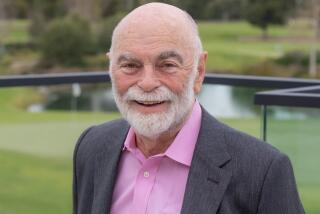The rise and fall of Bert Fields
NOT SO long ago, Bert Fields was, simply, Bert Fields. He was the most famous lawyer in Hollywood, a celebrity in his own right. National magazines and newspapers uncritically profiled him. Variety and the Hollywood Reporter ran his photo when he showed up at red carpet premieres. The New York Post’s Page Six noted who attended the dinners he gave at his Manhattan apartment, the abode that gave coastal balance to Fields’ other retreat in Malibu.
And why not?
For the record:
12:00 a.m. May 14, 2006 For The Record
Los Angeles Times Sunday May 14, 2006 Home Edition Current Part M Page 6 Editorial Pages Desk 1 inches; 56 words Type of Material: Correction
Bert Fields: A May 7 Current article about Hollywood lawyer Bert Fields implied that Fields had told the article’s author that he could be charged in the Anthony Pellicano wiretap case. In fact, Fields said he was a subject of the investigation but did not say that he could be charged. That was the author’s conclusion.
Tom Cruise, Warren Beatty, George Lucas, John Travolta and Dustin Hoffman are among the clients Fields has attracted over more than four decades of practice.
Moreover, Fields has cultivated a dapper and urbane image, based in part on his fondness for English tailoring and English history, about which he has written two books -- one examining whether Richard III, in fact, masterminded the deaths of his brother and nephews, and a second questioning whether William Shakespeare was really the author of all those plays and poems attributed to him. In 2003, Fields’ recipe for chicken fajitas rated a write-up in The Times.
In court, he was unflappable, ready to argue either constitutional issues or the most arcane aspects of corporate law.
Fields was more than an attorney to stars and studio heads. He had the respect of his peers, regularly making Top 10 and Top 100 attorney lists compiled by the legal trade press and based on attorney surveys.
And Fields always seemed to be at the heart of any big-time, headline-grabbing Hollywood lawsuit. He achieved legal stardom by representing DreamWorks mogul Jeffrey Katzenberg in Katzenberg’s $250-million action against the Walt Disney Co. Katzenberg claimed that Disney, where he had been head of film production, owed him a slice of the profits from such hits as “The Lion King” and “The Little Mermaid.”
The case was settled out of court in 1999 for undisclosed but presumably big bucks. But the settlement came only after weeks of a trial that included Fields’ memorable examination of then-Disney Chief Executive Michael Eisner. Among other things, Fields’ questioning revealed that Eisner had once said of Katzenberg, “I hate the little midget.” And no one who was in the courtroom will forget the sight of Eisner half rising from the witness chair to warn Fields that the attorney was pushing him too hard.
Thus, as he entered his 70s, Fields, now 77, seemed to be peaking at an age when most of his colleagues had retired from the law, except perhaps for deciding who to cut out of their wills.
But in November 2003, Fields broke the news to me and a colleague that he had been questioned by federal investigators about his use of Hollywood private eye Anthony Pellicano in his legal practice. Fields also told us that he was the subject of a wiretap investigation, that he could be charged in Pellicano’s alleged illicit wiretapping and spying.
Over time, the admission had a corrosive effect on Fields’ firm -- Greenberg, Glusker, Fields, Claman, Machtinger & Kinsella. Several partners have since left -- including partner Dale Kinsella -- and the firm has hired a full-time lawyer to handle matters stemming from the wiretap investigation, which is probing whether high-powered lawyers used Pellicano’s snooping to gain unfair advantage in lawsuits.
Fields’ statements sparked a new wave of publicity about the Pellicano probe, which had moved to the back pages since bursting onto the scene in 2002 in connection with threats made against a Los Angeles Times reporter.
Fields reputedly was stung by what he saw as a media backlash against him. Perhaps he failed to see how his statements might reverse perceptions of him.
When the first indictments connected to the Pellicano wiretap case finally came down in February, many stories noted that the charges included references to people and events with links to Fields and his firm. Some stories read like premature obituaries of Fields. In fact, the first attorney charged was Terry Christensen.
Whether or not Fields is named in another round of indictments, his once sterling image has been tarnished. If he is indicted, the charges against him also would highlight an ugly underbelly of L.A. law in which winning is everything. Some attorneys have told me that the scandal has the potential to taint every Hollywood lawyer as a suspected cheater.
And then Tinseltown would truly be what everybody else already thinks it is -- a place where nobody can be trusted.
More to Read
Sign up for our Book Club newsletter
Get the latest news, events and more from the Los Angeles Times Book Club, and help us get L.A. reading and talking.
You may occasionally receive promotional content from the Los Angeles Times.






